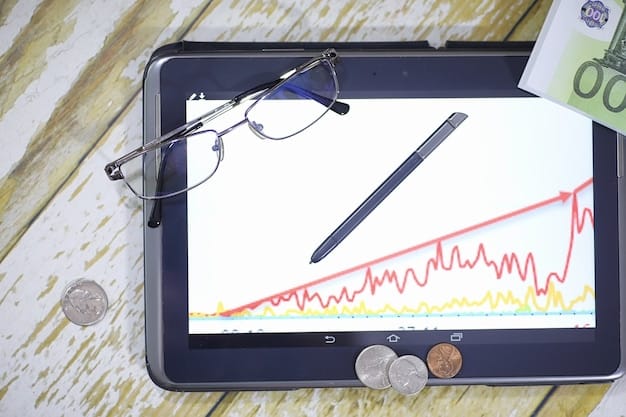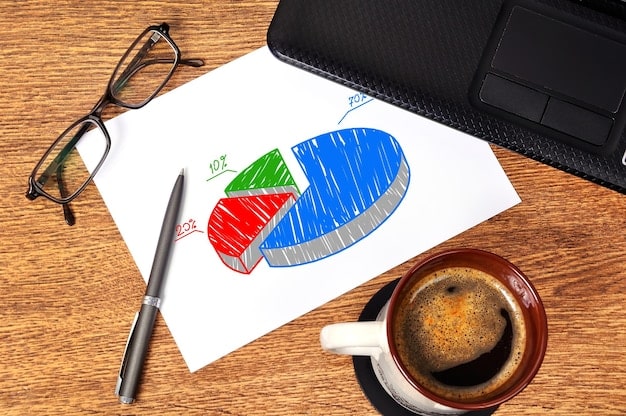How Will 2.8% Inflation in 2025 Affect Your Budget?

The projected 2.8% inflation rate in 2025 will likely increase the cost of goods and services, impacting personal budgets by requiring adjustments to spending habits, savings strategies, and investment plans to maintain financial stability.
Are you prepared for the financial landscape of 2025? The projected 2.8% inflation rate is poised to impact your personal finances. Let’s explore how will the projected 2.8% inflation rate in 2025 impact your personal budget and what strategies you can use to navigate these economic shifts.
Understanding Inflation and Its Impact
Inflation, the rate at which the general level of prices for goods and services is rising, plays a crucial role in shaping our financial well-being. A projected inflation rate of 2.8% in 2025 might seem modest, but its cumulative effect can significantly erode purchasing power.
Understanding the basics of inflation is the first step in preparing your budget. Inflation affects everything from the cost of groceries to the price of gas, and even the interest rates on your loans.
What is Inflation?
Inflation is an economic phenomenon characterized by a sustained increase in the general price level of goods and services in an economy over a period of time. When the price level rises, each unit of currency buys fewer goods and services.
How Does Inflation Affect Purchasing Power?
Inflation reduces the purchasing power of each dollar you hold. This means that as prices rise due to inflation, you can buy fewer goods and services with the same amount of money. For example, if a loaf of bread costs $3 today and inflation is 2.8%, that same loaf could cost $3.08 in 2025. Over time, these small increases add up.
- Monitor Price Changes: Keep an eye on the prices of frequently purchased items.
- Adjust Your Budget: Regularly review and adjust your budget to account for rising costs.
- Consider Inflation-Adjusted Investments: Explore investments that can outpace inflation.
In summary, understanding inflation and its impact on purchasing power is essential for effective financial planning. By staying informed and proactive, you can mitigate the negative effects of inflation on your personal budget.
Analyzing the 2.8% Inflation Forecast
The projected rate of 2.8% for 2025 carries with it specific implications for various aspects of your budget. It’s important to delve into what this percentage signifies and how it contrasts with historical inflation trends.
Examining the 2.8% inflation forecast requires a deeper dive into the potential effects on your spending, saving, and investment strategies. It is not merely a number; it’s a signpost of changes to come.
What Does a 2.8% Inflation Rate Mean?
A 2.8% inflation rate means that, on average, prices for goods and services are expected to increase by 2.8% over the course of 2025. This means you’ll need roughly 2.8% more money to buy the same items you purchased in the previous year.
Historical Inflation Trends
To put this projection in perspective, it’s useful to compare it with historical inflation trends. In recent decades, the US has experienced periods of both higher and lower inflation. Understanding these historical patterns can provide context and inform your financial decisions.

- Research Historical Data: Consult economic reports and data from sources like the Bureau of Labor Statistics.
- Identify Spending Adjustments: Pinpoint areas in your budget where you may need to cut back or reallocate funds.
- Seek Expert Advice: Consult with a financial advisor to create a customized plan.
In conclusion, analyzing the 2.8% inflation forecast requires understanding its implications and comparing it with historical trends. This analysis enables you to make informed financial decisions and prepare for the future impact on your budget.
Impact on Everyday Expenses
One of the most immediate effects of inflation is felt in our everyday expenses. From groceries to transportation, rising prices can strain your budget and require careful adjustments.
Understanding how inflation affects everyday expenses is vital for maintaining financial stability. This requires a close look at your spending habits and where you can make necessary changes.
Groceries and Food Costs
Grocery prices are often among the first to reflect inflationary pressures. As the cost of food production and transportation increases, these costs are passed on to consumers. Expect to see increases in the prices of staples like bread, milk, meat, and produce.
Transportation Costs
Transportation costs, including gasoline, public transit, and car maintenance, are also significantly influenced by inflation. Rising fuel prices and increased costs of car parts and services can add up quickly.
- Plan Meals Strategically: Plan your meals around sales and seasonal produce.
- Explore Transportation Alternatives: Consider biking, walking, or public transit.
- Track Your Spending: Monitor your expenses to identify areas where you can cut back.
In summary, the impact of inflation on everyday expenses can be substantial. By understanding these effects and making smart choices, you can mitigate the strain on your personal budget and maintain financial control.
Strategies for Budget Adjustment
Adjusting your budget in response to inflation is essential for maintaining financial health. This involves making strategic changes to both your income and expenses.
Implementing effective strategies for budget adjustment will enable you to address the rise in prices anticipated in 2025. These strategies can help you stay afloat even as the cost of living increases.
Increasing Your Income
One way to combat inflation is to increase your income. This could involve seeking a raise at your current job, taking on a side hustle, or exploring new career opportunities.
Reducing Discretionary Spending
Cutting back on discretionary spending can free up funds to cover essential expenses impacted by inflation. Review your spending habits and identify areas where you can reduce costs without sacrificing your quality of life.

- Negotiate Salary: Research industry standards and negotiate a fair salary that reflects your value.
- Automate Savings: Set up automatic transfers to your savings account to ensure consistent savings.
- Review Insurance Policies: Shop around for better rates on insurance policies.
In conclusion, adjusting your budget in response to inflation requires a multifaceted approach. By increasing your income and reducing discretionary spending, you can better cope with rising prices and maintain financial stability.
Optimizing Savings and Investments
In an inflationary environment, it’s crucial to optimize your savings and investment strategies to protect and grow your wealth. Traditional savings accounts may not keep pace with inflation, making it necessary to explore alternative options.
Optimizing savings and investments can help you to preserve your financial security, even in the face of a 2.8% inflation rate. Planning for investments that keep up is essential for financial security.
High-Yield Savings Accounts
Consider moving your savings to a high-yield savings account that offers a more competitive interest rate. While these rates may still be lower than the inflation rate, they can help offset some of the loss of purchasing power.
Inflation-Protected Securities
Treasury Inflation-Protected Securities (TIPS) are designed to protect investors from inflation. The principal of TIPS increases with inflation and decreases with deflation, as measured by the Consumer Price Index.
Here’s a summary of key investment strategies to consider during inflation:
- Diversify Your Portfolio: Spread your investments across different asset classes to reduce risk.
- Rebalance Regularly: Rebalance your portfolio periodically to maintain your desired asset allocation.
- Stay Informed: Keep up-to-date with market trends and economic news.
In summary, optimizing your savings and investment strategies is vital for protecting your wealth during inflation. Consider high-yield savings accounts and inflation-protected securities to help your money grow faster than the inflation rate.
Long-Term Financial Planning Considerations
Inflation can significantly impact your long-term financial goals, such as retirement planning and college savings. It’s essential to factor inflation into your calculations to ensure you’re on track to achieve your objectives.
Planning for the future while keeping the 2.8% inflation rate in mind requires a thoughtful strategy. This way your assets will continue to grow.
Retirement Planning
When planning for retirement, it’s crucial to estimate your future expenses and account for inflation. Consider how rising prices will affect your cost of living and adjust your savings goals accordingly.
College Savings
The cost of college education has been rising faster than the general inflation rate for many years. When saving for your children’s or grandchildren’s education, factor in both general inflation and the higher education inflation rate.
- Consult a Financial Advisor: Seek advice from a financial advisor who can help you develop a personalized plan.
- Review Your Goals Regularly: Reassess your financial goals periodically to ensure they align with your changing needs and circumstances.
- Stay Disciplined: Stick to your financial plan and avoid impulsive decisions.
In conclusion, long-term financial planning requires careful consideration of inflation. By factoring inflation into your calculations and adjusting your strategies accordingly, you can increase your chances of achieving your long-term goals.
| Key Point | Brief Description |
|---|---|
| 💰 Inflation Impact | 2.8% inflation in 2025 will raise prices, reducing purchasing power. |
| 🛒 Spending Adjustments | Reduce discretionary spending and adjust grocery shopping habits. |
| 🚀 Investment Strategies | Consider high-yield savings and inflation-protected securities. |
| 📈 Income Increase | Seek a raise, start a side hustle, or explore new job opportunities. |
Frequently Asked Questions
▼
The primary drivers of inflation often include an increase in demand, a decrease in supply, or rising production costs that push prices higher.
▼
Consider investing in assets that tend to outpace inflation, such as stocks, real estate, or inflation-protected securities.
▼
TIPS, or Treasury Inflation-Protected Securities, are U.S. government bonds that are indexed to inflation, offering protection to investors.
▼
It depends on your financial goals and risk tolerance. Diversifying your investments and consulting a financial advisor can be beneficial.
▼
Inflation reduces the purchasing power of your retirement savings. It’s important to factor inflation into your retirement projections to ensure accurate forecasting.
Conclusion
Navigating the financial landscape with a projected 2.8% inflation rate in 2025 requires proactive planning and informed decision-making. By understanding the impact of inflation on your budget, implementing strategies for adjustment, optimizing savings and investments, and considering long-term financial implications, you can effectively manage your finances and maintain financial stability in the face of rising prices.





